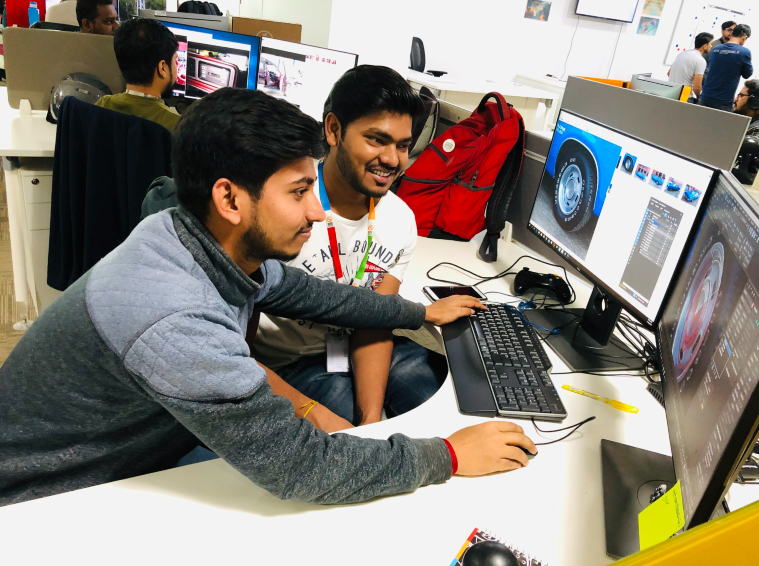 Sackboy: A Big Adventure squarely focuses on 3D platforming but retains the papercraft and charm the LittleBigPlanet franchise is known for. The game is available on both PS5 and PS4. (Image credit: PlayStation)
Sackboy: A Big Adventure squarely focuses on 3D platforming but retains the papercraft and charm the LittleBigPlanet franchise is known for. The game is available on both PS5 and PS4. (Image credit: PlayStation) When Sackboy: A Big Adventure hit the PlayStation 5 last year, critics hailed the 3D platformer for its level design, music, and visuals. But not many people know that a lot of development work for the BAFTA-winning AAA console game was done by Sumo Pune, one of the studios the UK-based developer Sumo Digital operates in India.
“The contribution of Sumo Pune in the development of Sackboy: A Big Adventure is a big one. We designed specific levels and contributed to the art and the gameplay programming across all disciplines,” Stewart Neal, Studio Director at Sumo Pune tells indianexpress.com over a video call from Sheffield, England. He said their work wasn’t limited to art but spread across other aspects like environment, props, animation, game design, level design as well as programming. Neal says over 60 team members of Sumo Pune worked on the game.
Sackboy: A Big Adventure, a spin-off game of the LittleBigPlanet series, was one of the launch titles for Sony’s latest PlayStation 5 last year. Developed by Sumo Digital, who also helmed LittleBigPlanet 3, Sackboy has become a PlayStation mascot, thanks to a number of spin-offs and appearances on both Sony’s handheld and home consoles.
Also read: PlayStation 5 review: A hint of the future
Although Sumo Pune has not developed a AAA game on its own yet, Neal says the studio has been helping co-develop titles within the company with significant contributions. “We are currently working across around 12 projects,” he says, without sharing details.
Sumo Digital opened its Pune studio in 2007, initially as an art support studio. Over the years, however, it has transformed into a multidiscipline development studio with over 140 people. “India is an important market for the long term and we will continue to hire more and expand our skills,” Neal says.
 Pune is fast emerging as the video game development hub of India. (Image credit: Sumo Digital)
Pune is fast emerging as the video game development hub of India. (Image credit: Sumo Digital)
Though the home console market in India is tiny compared to that of mature territories like the US and Europe, some developers like Sumo Digital want to use India as a major exporter of games and develop AAA titles almost exclusively for game consoles. “The main challenge is hiring and recruitment… there’s a lot of competition out there driven by the needs of content and the actual growth of the industry,” he explains, adding that India has a “lot of highly-skilled talented people”. Sumo Digital competes with Ubisoft as well as local developers for Indian talent.
Mobile gaming is big in India due to the increasing penetration of smartphones and the free-to-play nature of many popular titles. But video game consoles and high-priced games still remain out of reach for average users. Still, the country is fast emerging as an export hub for game developers and eSports companies are increasing their investments.
“Video Games were previously seen as a niche sector, but as we have seen over the years, it continues to expand and develop as more exposure happens across the sector,” Neil comments on how developing video games is now accepted as a career option. “It’s definitely one of the recognised sectors to work in now.”
Recently, another small indie studio in Pune, Nodding Heads Games, gained global fame with the release of Raji: An Ancient Epic, an action-adventure game based on Indian folklore. It was first released as a timed exclusive for Nintendo Switch in the middle of last year, and later made available on other platforms, including Xbox Game Pass.
 Neil, who has been with Sumo Digital since 2014, was previously working with UK’s Codemasters. (Image credit: Sumo Digital)
Neil, who has been with Sumo Digital since 2014, was previously working with UK’s Codemasters. (Image credit: Sumo Digital)
The success of Raji: An Ancient Epic shows that there is a market for video games when the makers tell Indian stories that connect with audiences worldwide. Neil agrees with the element of “Indianness” in video games, but gave no insight into how Sumo Digital could use the same.
Neil, who has been with Sumo Digital since 2014, was previously working with UK’s Codemasters, the studio best-known for Formula One and Dirt franchises, which was picked up by Electronic Arts (EA) in a deal worth $1.2 billion last year.
Founded in Yorkshire in 2003, Sumo Digital has developed games for Sony, Microsoft and Sega and is known for hit installments in the Forza, Hitman, Sonic and LittleBigPlanet franchises. Sumo was in the news recently when the Chinese tech giant Tencent, perhaps the world’s largest games publisher, agreed to buy out the UK developer for $1.3 billion. Tencent has previously owned a minority stake in Sumo after acquiring 8.75 per cent of the company in November 2019.
- The Indian Express website has been rated GREEN for its credibility and trustworthiness by Newsguard, a global service that rates news sources for their journalistic standards.

